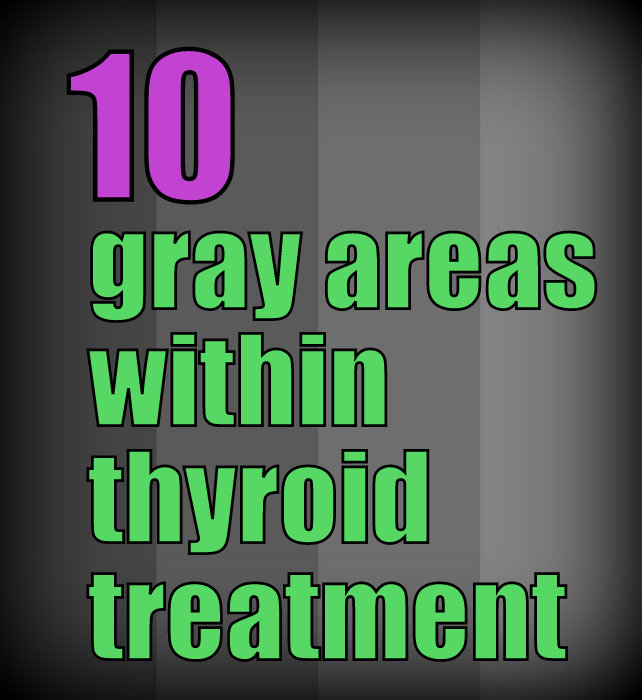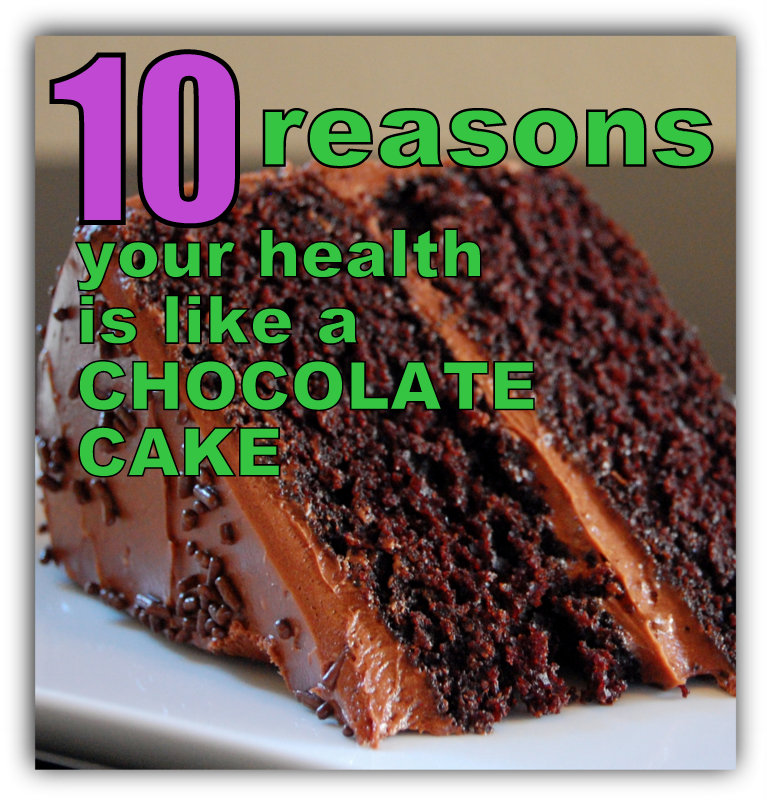10 Gray Areas about Thyroid Treatment and related issues: The Anomalies
 Ever heard of the word “anomaly“? It means that which deviates from what is standard, normal, or expected. You could also call it the “gray areas”.
Ever heard of the word “anomaly“? It means that which deviates from what is standard, normal, or expected. You could also call it the “gray areas”.
And when you’ve observed and compiled thyroid patient experiences and wisdom as long as I have, one thing certainly stands out: though something may be true for the majority of thyroid patients, it may not be true for others.
Here are 10 of those anomalies when it comes to thyroid treatment and issues related – – all based on repeated observations:Â
-
HASHIMOTOS and GLUTEN:
Though the majority of Hashimoto’s patients seem to need to be off gluten to control their antibodies and improve nutrient absorption, there have always been a small percentage of those who have never had problems with consuming gluten….ever.
i.e. though their once-high antibodies revealed their Hashimotos state, eating gluten didn’t make them worse, nor did gluten consumption bring their antibodies back up after they had gotten them down due to a better thyroid treatment or use of iodine. (Yes, iodine use has helped many Hashi’s patients bring their antibodies down).
-
SYNTHROID OR OTHER T4-ONLY MEDS:
Though we’ve observed that the biggest body of Synthroid or T4-only users see the failure of their treatment either from the beginning or within the first few years (in their own degree and kind), there is a small percentage who may not see the failure for 15, 20 years or more, and an even smaller body who feel they never have problems from it (though they usually do and don’t recognize them as problems related to being forced to live for conversion alone). Â
Informed thyroid patients have observed that in fact, some T4-users convert to T3 (the active hormone), better than others…for awhile. Â Other T4 users may never have needed treatment at all. My sister-in-law is an example. Her doctor once found her TSH was high, so he put her on Synthroid. She seemed to do fabulously for about 4 years. Then she stopped and was fine. Looking back, there’s a good possibility that chronic stress was pushing her cortisol high, which promotes a hypothyroid state and higher TSH…thus the appearance of thyroid disease. When the chronic stress is resolved, the “hypothyroid state” goes away.
-
ADRENAL ISSUES:
Though we’ve observed that at least 50% or more of thyroid patients end up with an adrenal problem due to being on the inadequate T4-only or other stressors to their adrenals, there is another body of patients who never seem to acquire adrenal problems yet had every stressful reason to.Â
Who knows why some escape it. My mother was on Synthroid her entire adult life and paid horrible prices, yet I saw no evidence of an adrenal problem. I was the same–had a million reasons to see my adrenals become sluggish, yet it didn’t happen. Something about our biological or genetic makeup in response to stress? Our way of handling stress? Supplements we took?
-
HOW MUCH NDT CAN BE TOLERATED WITH LOW CORTISOL
Though a large body of low cortisol patients can only tolerate “up to” 1 1/2 grains of NDT without having problems, if they go higher, they start to see either pooling of T3 or rising RT3. A smaller percentage can go much higher without noticeable issues, and another small percentage can’t even go as high as one grain without seeing those issues. But they are there.
When one’s cortisol is a problem, especially when it’s too low, NDT at certain raises will reveal the low cortisol. i.e. NDT is not the problem; it’s revealing the problem via the raises. //www.stopthethyroidmadness.com/ndt-doesnt-work-for-me
-
WEIGHT GAIN:
Though it appears the majority of thyroid patients will either gain easy and/or have trouble losing weight, there is a smaller minority with hypothyroidism who stay thin.
There are so many possibilities as to why some hypothyroid patients stay thin, ranging from not being one who uses food to treat emotions…to all the genetic differences in how each of us burns fat or what one craves. http://www.theguardian.com/world/2012/jul/17/food-metabolism-calories-obesity-diet
-
WOMEN VS MEN AND HYPOTHYROIDISM
Though the majority of hypothyroid sufferers appear to be women, there are a body of men who will find themselves in a hypothyroid and/or adrenal state, as well.Â
There is speculation that because of women’s hormonal changes, it makes them more susceptible to having a thyroid problem. But men get thyroid problems, too, so the problems of toxins in our environment and/or low iodine may be other issues affecting both males and females, even if females with their hormonal issues get it more often.
-
OPTIMAL AMOUNTS OF NATURAL DESICCATED THYROID (NDT)
Though it appears that a large body of thyroid patients, when optimal, end up in the upper two grain area AND HIGHER…there is a much smaller body who are even higher than the 3-5 grain area, and the very minority are optimal less than 2 grains.Â
If a line is drawn with the least amount of NDT on the left, and the highest amount of NDT on the right, and with a dot representing each person on an optimal amount of NDT, the majority of dots start to fall in the upper 2 grain area and into the 3 grain area. A lesser amount of dots fall in the 4-5 grains area, and fewer dots are higher. Same with the other direction, Much lesser dots are in the lower 2 grains area, and even less in the 1-2 grain area. Of course, this observation is only true when participants understand what “optimal” really means (which many do not) and is explained on the Natural Thyroid 101 page.
-
DOCTORS
Though patients have reported over the years that the majority of their doctors are overtly clueless about either diagnosing or correctly treating their thyroid disease, there are a small and growing percentage of medical professionals who are bucking the trend and taking the time to listen to informed patients and Stop the Thyroid Madness, both website and books.Â
And honestly, we all play a role in strengthening that trend by politely yet confidently being your own best advocate, learning what patients have learned, and having the courage to explain it to your doctor, besides make it clear that “this” is how you want to do “that”. If a doctor will not listen, we put our money into the hands of those who will. A doctor works for YOU, not you for him or her. Here’s how to find a good doc.
-
PROGESTERONE
Though many (not all)Â females see their sex hormones mess up in conjunction with having hypothyroidism…and thus, can need progesterone supplementation to counter estrogen, there is a risk of having the progesterone convert to too much cortisol and causing miserable symptoms of high cortisol!
In the hormonal pathway of conversions, there are some who convert progesterone to cortisol far easier than others. So each person has to figure out how much progesterone they can handle, which is probably individual. If cortisol is low, though, progesterone converting to cortisol can be a slight boon! 🙂
-
ACID REFLUX/GERD
Though it’s very common for doctors to prescribe acid reducers like Prilosec or over-the-counter antacids like Tums for your GERD or Acid Reflux….in reality for thyroid patients, turns out they have LOW stomach acid causing the reflux, not high.Â
Though antacids will seem to relieve the symptoms, it’s actually making the low stomach acid now worse, which in turn makes your ability to absorb nurtrients worse. Read about this issue right here: //www.stopthethyroidmadness.com/stomach-acid
* Join the STTM Facebook group for daily tips, information, and wisdom!



